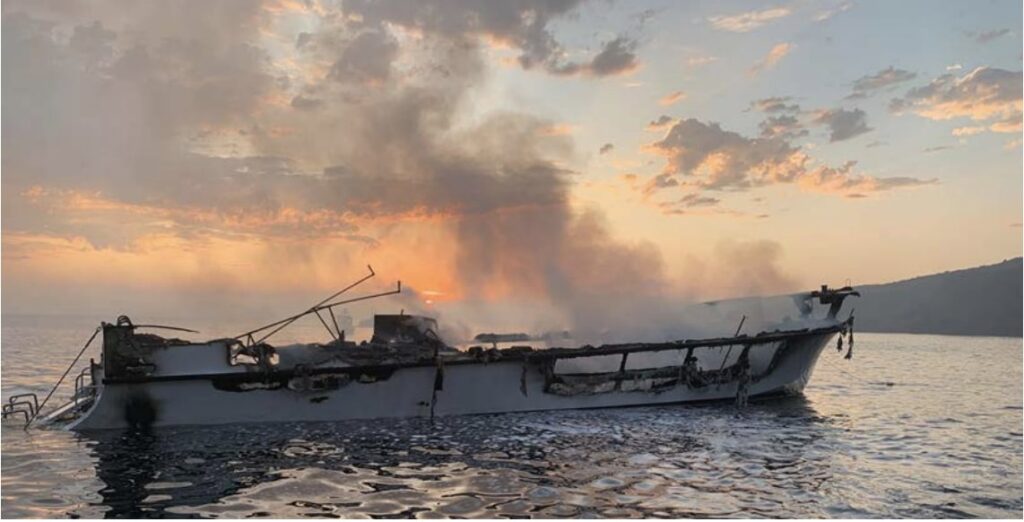(LOS ANGELES) — When Jerry Boylan walked into the courtroom in the U.S. District Court in Los Angeles, he kept his head down, avoiding the stares of the two dozen people who blame him for the deaths of their loved ones. When he walked out ten days later, he was a convicted man.
The United States v Jerry Boylan trial began Oct. 24 after a four-year investigation of the P/V Conception disaster.
In the early morning of Sept. 2, 2019, the Conception dive boat caught fire killing 33 passengers and one crew member.
There were only five survivors—four crew members and Boylan, who was captain of the ship.
Boylan pleaded not guilty to one count of misconduct or neglect of ship officer or “seaman’s manslaughter.”
According to the National Transportation Safety Board’s investigation, the 33 passengers were going on a scuba-diving trip near the Channel Islands off Santa Cruz, California. The passengers, who ranged from 16 to 62 years old, were likely asleep when the fire started. The Conception’s bunks were in the basement and the staircases leading up to the main deck and the escape hatch were all blocked by the fire.
The survivors were on the top level of the boat when the fire started and were able to jump into the water. Boylan jumped first and then instructed the crew members to do the same. Investigators were unable to determine the cause of the fire which started on the main deck.
The prosecution, led by Matthew O’Brien, argued that by jumping off the Conception, Boylan acted negligently and the deaths could have been prevented. O’Brien said that Boylan didn’t follow the Coast Guard’s protocol for boat fires, both in prevention and after the Conception lit on fire.
Coast Guard rules state that there should be one crew member on night watch roving the boat. On the Conception, instead of roving, that crew member was asleep in the passenger bunks. Once a fire starts, the ship’s captain is supposed to take certain steps to fight the fire before abandoning ship—something the prosecution said Boylan failed to do.
Public Defender Georgina Wakefield argued that Boylan did everything he could to save the boat and its passengers. She put the blame on Conception’s owner, Glen Fritzler, saying that he failed to train the crew and provide adequate fire-fighting equipment.
The Conception fire was the deadliest maritime disaster in the United States in recent history.
On Oct. 12, U.S. District Judge George H. Wu granted the defense’s request to prohibit the use of the word “victim” to refer to those who died on the Conception.
The trial started on Oct. 24 with jury selection. The next day, jury selection concluded and both sides gave their opening arguments.
First on the stand was the FBI special agent in charge of the four-year investigation. The prosecutors showed a 20-second video taken by one of the passengers during the fire. It shows the passengers frantically trying to escape the boat’s basement. “There’s got to be more extinguishers,” one passenger said.
Family members in the courtroom cried watching their loved ones fighting for their lives.
Others in the courtroom also cried on several occasions. Before the proceeding started, the sister of a victim passed around a tissue box.
One woman, whose father was on the Conception, purposely sat at the seat closest to the door. On day two, U.S. District Judge George H. Wu had asked her to step outside because she was unable to control herself after hearing the sound of her father’s voice.
The start of the third day of trial was delayed two hours because one juror was unsure if she would be able to report for duty. Judge Wu told the court that after the trial convened the day before, the juror had a panic attack and was hospitalized for the night, a reaction to what many assumed was the intense content of the opening remarks.
Many of the loved ones of those killed on the Conception have gotten to know each other over the years. They chatted before and after the trial and comforted each other during.
The victims’ families are also suing the Coast Guard for failing to enforce the roving watchman requirement.
The jury deliberated for eight hours on Nov. 6, ultimately finding Boylan guilty. He faces up to 10 years in prison, according to a press release from the U.S. Attorney’s Office for the Central District of California.
The prosecution and the defense denied The Click’s request for comment. Boylan’s sentencing hearing is set for Feb. 8, 2024.


